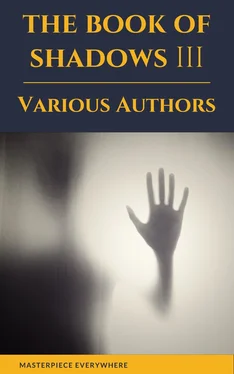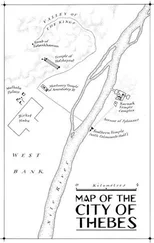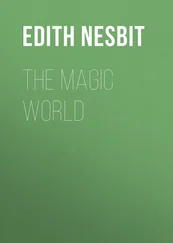“This house is to be let, I believe; will you allow me to look over it?” he asked, turning towards me as I entered.
His voice seemed familiar; I looked at him more closely, and then, in spite of the change in his appearance, I recognised Captain Vandeleur.
What could have brought him here, I wondered. Surely he would not care to return to the house, even if he were in a position to do so – which, judging from the shabbiness of his appearance, seemed very doubtful.
Half-a-dozen vague conjectures flashed through my mind, as I glanced at his face, and noticed the restless, “hunted” look which told of some wearing dread or anxiety.
After a moment’s hesitation I assented to his request, and resolved to conduct him myself on his tour of inspection.
“I think I have met you before,” I said, feeling curious to know whether he recollected me.
He glanced at me absently.
“Possibly – but not of late years; for I have been living abroad,” was his reply.
Having shown him the apartments on the ground-floor, I led the way upstairs. He followed me from room to room in an absent, listless fashion, till we came to the chamber which Ethel had occupied. Then his interest seemed to revive all at once.
He glanced quickly round the walls, his eyes resting on the door of the box-closet.
“That is a bath or dressing-room, I suppose,” he said, nodding towards it.
“No, only a place for lumber. Perhaps I ought to tell you that it is said to be haunted,” I added, affecting to speak carelessly, while I kept my eyes on his face.
He started and turned towards me.
“Haunted – by what?” he enquired, with a faint sneer. “Nothing worse than rats or mice, I expect.”
“There is a tragical story connected with that place,” I answered, deliberately. “It is said that an unfortunate child was shut up there to die of fear, in the dark.”
The colour rushed to his face, then retreated, leaving it deadly white.
“Indeed!” he faltered; “and do you mean to say that he – the child – has been seen?”
“No, but he has been heard, knocking within, and crying to be let out. The fact is confirmed by every tenant who has occupied the house since—”
I stopped short, startled by the effect of my revelation.
My companion was gazing at me with a blank stare of horror which banished all other expression from his face.
“Good heavens!” I heard him mutter; “can it be true? Can this be the reason why I was drawn back to the place in spite of myself?”
Recollecting himself, however, he turned to me, and forced his white lips into a smile.
“A mysterious story!” he commented, drily. “I don’t believe a word of it, myself, but I should hardly care to take a house with such an uncanny reputation. I think I need not trouble you any further.”
As he turned towards the door, I saw his figure sway as if he were falling. He put his hand to his side, with a gasp of pain, a bluish shade gathering over his face.
“Are you ill?” I exclaimed, in alarm.
“I – it is nothing. I have a weakness of the heart, and I am subject to these attacks. May I ask you for a glass of water?”
I left the room to procure it. When I returned I found that he had fallen upon the bed in a dead swoon.
I hastily despatched a servant for Dr. Cameron, who happened to be at home, and came immediately.
He recognised my visitor at once, and glanced at me significantly. I rapidly explained what had happened, while he bent over the unconscious man, and bared his chest to listen to the heart-beats.
When he raised himself his face was ominously grave.
“Is he in danger?” I asked, quickly.
“Not in immediate danger, but the next attack will probably be his last. His heart is mortally diseased.”
It was nearly an hour before Vandeleur awoke, and then only to partial consciousness. He lay in a sort of stupor, his limbs nerveless, his hands damp and cold.
“It is impossible to remove him in this condition,” the doctor remarked; “I fear he must stay here for the night. I will send you someone to watch him.”
“Don’t trouble – I intend to sit up with him myself,” I replied, speaking on an impulse I could hardly explain.
He looked at me keenly over his spectacles.
“Should you like me to share your watch?” he enquired, after a moment.
“I shall be only too glad of your company, if you can come without inconvenience.”
He nodded.
“I must leave you now, but I will return in an hour,” he responded.
• • • • •
Three hours had passed away; it was nearly midnight. The night was oppressively close, and profoundly still. The bedroom window stood wide open, but not a breath of air stirred the curtains. Outside, all was vague and dark, for neither moon nor stars were visible.
Vandeleur still lay, half-dressed, on the bed, but now asleep. His deep, regular breathing sounded distinctly in the silence. Dr. Cameron sat near the dressing-table, reading by the light of a shaded lamp. I, too, had a book, but found it impossible to keep my attention fixed upon it. My mind was possessed by an uneasy feeling, half dread, half expectation. I found myself listening nervously to fancied sounds, and starting when the doctor turned a leaf.
At length, overcome by the heat and stillness, I closed my eyes, and unconsciously sank into a doze. How long it lasted I cannot tell, but I woke abruptly, and looked round with a sense of vague alarm. I glanced at the doctor. He had laid down his book, and was leaning forward with one arm on the dressing-table, looking intently towards the door of the box-room. Instinctively I held my breath and listened.
Never shall I forget the thrill that ran through my nerves when I heard from within a muffled knocking sound, and a child’s voice, distinct, though faint, and broken by sobs, crying piteously: “Let me out – let me out!”
“Do you hear?” I whispered, bending forward to my companion.
He inclined his head in assent and motioned me to be silent, pointing towards the bed. Its occupant moved uneasily, as if disturbed, muttering some incoherent phrases. Suddenly he pushed back his covering and sat upright, gazing round with a wild, bewildered stare.
The pitiful entreaty was repeated more violently, more passionately than before. “Let me out, let me out!”
With a cry that rang through the room, Vandeleur sprang from the bed, reached the closet door in two strides and tore it open.
It was empty. Empty at least to our eyes, but it was evident that our companion beheld what we could not.
For a few breathless seconds he stood as if frozen, his eyes fixed with the fascination of terror on something just within the threshold; then, as if retreating before it, he recoiled step by step across the room till he was stopped by the opposite wall, where he crouched in an attitude of abject fear.
The sight was so horrible that I could bear it no longer.
“Are you dreaming? wake up!” I exclaimed, and shook his shoulder.
He raised his eyes, and looked at me vacantly. His lips moved, but no sound came from them. Suddenly a convulsive shudder ran through him and he fell heavily forward at my feet.
“He has swooned again,” I said turning to my companion, who stooped and lifted the drooping head on to his knee.
After one glance, he laid it gently down again.
“He is dead,” was his grave reply.
• • • • •
And with Vandeleur’s death my story ends, for after that night the sounds were heard no more. The forlorn little ghost was at rest.
Sir Herbert Stephen
1885
I
We were sitting in the drawing-room of our house at Bayswater one evening after dinner, in high good-humour. I had that day been appointed to a certain post at the British Museum which would afford me ample opportunity for the studies in which I was most interested, and put me in possession of what I expected to find an ample competence. We had been talking over my prospects, and the only cloud I could discern upon the horizon was that I should have to be at my post at an earlier hour in the morning than was comfortably compatible with the three-mile walk from our house to the Museum.
Читать дальше












